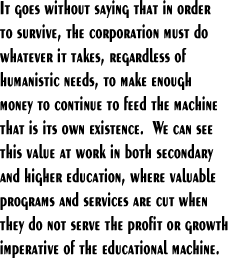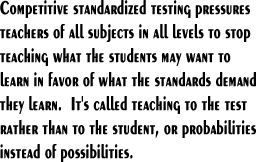1. In 1916, then Amherst College President
Alexander Meiklejohn
suggested:
insofar as a society is dominated
by the attitudes of competitive business enterprise, freedom in its proper
American meaning cannot be known, and hence, cannot be taught. That
is the basic reason why the schools and colleges, which are, presumably,
commissioned to study and promote the ways of freedom are so weak, so confused,
so ineffectual (as qtd. in Burger np).
2. Meiklejohn spent his entire life fighting
against education
becoming a pawn to corporate enterprise,
preferring instead a
model based on what he believed to be more
traditional ideals of
humanistic education, the free and open exchange
of ideas, a
culture of possibilities rather than probabilities.
Not surprisingly, Meiklejohn was run out of Amherst seven years after his
inauguration, accused of being a Communist or a sympathizer. In the
history of anti-corporate sentiment, proponents of possibilities, free
curricular design, and true academic freedom have often met with such accusations,
as if being against a corporate ideology was somehow synonymous with being
against America herself. Even today, it's hard to argue against the
supposed altruism of corporate America. What could possibly be wrong
with the ideals present in the work-a-day world coming into the university?
What could possibly be amiss in training our students to fit corporate
expectations when they leave our
hallowed halls?
3. Perhaps it would be easier to answer that
question if I put it
this way. What would be the difference,
for your own elementary
or high school child, between the vocational
education
program--where students are taught basics
and trained for a
specific task, most likely in a factory--and
education in
critical thinking that will open up the entire
world? Would you
prefer that your child only study grammar
and never receive a
course in the critical theory of world politics?
Would you
object if your child's daily routine was
sponsored by Pepsi,
never allowing him to choose Coke, or perhaps
iced tea? Do you
want your child to question or merely to
accept? Furthermore,
would you want your child's school to prepare
our future
corporate workers or our future thinkers,
dreamers, scholars, and
leaders? When we ask those questions
about our children's
educational environments, the answers seem
to come easily. And
yet, when we ask those same questions of
higher education, we
somehow become fuzzy. Are grown children
somehow less precious?
4. I don't think there is anything wrong with
vocational
education as a supplement to a critical education.
But we all
know how it works. Those who do well
on standardized tests will
never see a vocational day in their lives.
Those who can't cope
with a test that has nothing at all to do
with their real lives
will most likely find themselves happy to
never be challenged
again. Training is quite different
from education. Learning a
skill is not the same thing as learning to
think. Training
involves repeating the same task over and
again until it is
mastered, a mastery of the probabilities
of daily experience.
Education, on the other hand, involves opening
yourself up to
possibilities, seeing things from as many
different perspectives
as one can imagine, walking around the statue
rather than
assuming you know its entire essence by staring
at it from the
front. This is critical knowledge.
And with critical knowledge
comes freedom, freedom of the kind that Meiklejohn
suggests
should be the primary function of a university
education. With
knowledge comes the necessity to question,
to ask why, to find
the holes still needing to be filled.
Possibilities will never
be explored when the answers have already
been set in stone.
5. And so the next question is obvious.
How does a university
education that is mired in corporate ideology
and corporate
culture restrict the kind of critical knowledge
of which I have
spoken? Perhaps the answer lies in
the values behind the
corporate enterprise itself. Jerry
Mander, in his work on
corporate culture's effect on American humanistic
values (as well
as the cultures of the Indian nations), describes
several "rules
of corporate behavior" which I'll summarize
briefly and then show
their impact on curricular issues.
6. Corporations have both a profit and a growth
imperative. It
goes without saying that in order to survive,
the corporation
must do whatever it takes, regardless of
humanistic needs, to
make enough money to continue to feed the
machine that is its own
existence. We can see this value at
work in both secondary and
higher education, where valuable programs
and services are cut
when they do not serve the profit or growth
imperative of the
educational machine. Courses that historically
have been
important to a well-rounded critical education
have hit the
chopping block because corporate values argue
that their
enrollment numbers were not high enough to
sustain the cost of
the room, the teacher, or, for that matter,
the ink on the
schedule, and their usefulness to the business
mindset is
doubtful. Why, for example, teach Shakespeare
when technical
writing is what serves the machine?
Why enter the murky world of
metaphor and analogy when one will only need
to write technical
reports to bring home the check? In
a broader perspective, this
is the sort of corporate imperative that
has spelled the death of
humanistic study at the university.
Courses in the humanities
have continued to fade away, while those
in the business and
technical schools have doubled and sometimes
tripled.
Probabilities outweigh possibilities.
7. The spirit of competition is obligatory
in corporate culture.
Yet when competition enters the educational
arena, perspectives
can become skewed and priorities altered.
Recent examples are
the argument over school vouchers and, on
the university level,
the overvaluing and excessive funding of
sports programs as
opposed to, for example, libraries (e.g.
at UMKC). A further
irony arises when one considers that competition
may actually
promote standardization. Our desire
to be the best may well
result in our students becoming mere clones
of each other.
Standardization requires that all students,
regardless of life
context, know such-and-such information
with enough proficiency
to pass a standardized test. Competitive
standardized testing
determines whose child will receive training
and whose will
receive a critical education, which district
will be viewed
favorably for funding and which will be punished.
Competitive
standardized testing pressures teachers of
all subjects in all
levels to stop teaching what the students
may want to learn in
favor of what the standards demand they learn.
It's called
teaching to the test rather than to the student,
or probabilities
instead of possibilities.
8. There are other corporate values which
have effects on
curriculum. Corporate culture tends
toward amorality and
excludes altruistic goals. It is hierarchical,
with decisions
often made at a distance from the real-world
time and place of
the situation at hand. It is dehumanizing,
because people become
products and resources and names become identification
numbers.
And finally, corporate culture values quantification
while
shortchanging quality. Let knowledge
be objective rather than
subjective, impersonal rather than personal,
probable rather than
possible.
9. Corporations promote corporate values.
But shouldn't
educational values differ, even slightly?
Shouldn't we make a
distinction between the human being as developing
child and
working adult? Furthermore, shouldn't
education, in the long
run, be about the making of a well-rounded
citizenry capable of
participating in a democracy? Shouldn't
education value the
preparation of each person to be a productive
member of the
community rather than merely a producing
member of the
workforce? And given the distinctly
American value placed on a
free speaking, free thinking population,
isn't it wise to demand
that corporate interests be held at arm's
length from the
determination of what counts for knowledge
and its creation?
10. Apparently, corporations do not agree.
At the 1997
Asian-Pacific Economic Cooperation Forum
in Vancouver, Canada,
the 16 voting-member countries released a
policy statement on
education:
The emphasis on education for itself
or on education for good members of a community, without large emphasis
on preparation for future work, [is] no longer appropriate. In other
words, the idea that work is only an instrumental part of one's life is
no longer appropriate. Such a dichotomic [sic] view on education
and work cannot be justified in a world where economic development is emphasized
(as qtd. in Robertson np).
11. The APEC document goes on to recommend "maximum
business
intervention" in matters of curriculum, criticizing
curriculum
designed by "intellectual elites" who value
the teaching of
"concepts and theories," and even "learning
for the sake of
learning," without due attention to "outcomes."
Their final
recommendation to correct these problems?
"Business-education
partnerships" (Robertson np).
Unfortunately, what was a
possibility in 1997 becomes more of a probability
with every year
that passes.
12. There is one final corporate value that
encourages the
standardization of both curriculum and student,
the corporate
reliance on part-time, contingent employees.
What are the
benefits of using part-time employees?
Most are obvious: you
don't have to pay full, competitive wages;
there is no need to
supply benefits, such as insurance and retirement
packages; and
you are often not bound by contractual arrangements.
In
addition, part-time employees are alleged
to be easier to train,
because their jobs are generally skills-based,
rather than
complicated functions of an overall focus.
They do not need to
be educated toward the larger business operations,
but merely
trained to perform a specific task.
They are also easily hired
and easily fired as the profit and growth
imperative fluctuates.
Their job security relies on a force completely
out of their
control. And, finally, part-time employees
are regarded as
easily replaceable. Since they are
not people but embodiments of
skills devoid of critical perspective, one
is just like another.
It does not matter which person sits in the
chair. They are all
the same: homogenized, standardized.
13. What's ironic is that many modern corporations
are now seeing
the error of this way of thinking about part-time
employees. And
yet, our academic system still clings to
the vestiges of this
value long after it has become unwise and,
indeed, inhumane to do
so. Part-time faculty are easily hired,
easily fired, and
entirely replaceable. Part-time faculty
are underpaid,
overworked, and undervalued. And we
are undervalued primarily
because it is assumed that our courses have
already been hammered
into standardization and, therefore, can
be taught by anyone. But I
am not a resource or a number. I am
not bound by probabilities.
I am, however, continually freed by possibilities.
Works Cited
Burger, Neils. "Corporate Logic and the Authoritarian
University." Online. Available
FTP:
www.geocities.com/CollegePark/Housing/8930/logic.
11/15/00
Robertson, Heather-Jane. "In the New
McWorld Ruled by
Corporations." No More Teachers,
No More Books: The
Commercialization of Canada's Schools.
Beth Huber (huberb@umkc.edu)
is a Lecturer in English, University of Missouri, Kansas City, and President
of the UMKC Part Time Faculty Association |


|
![]()
